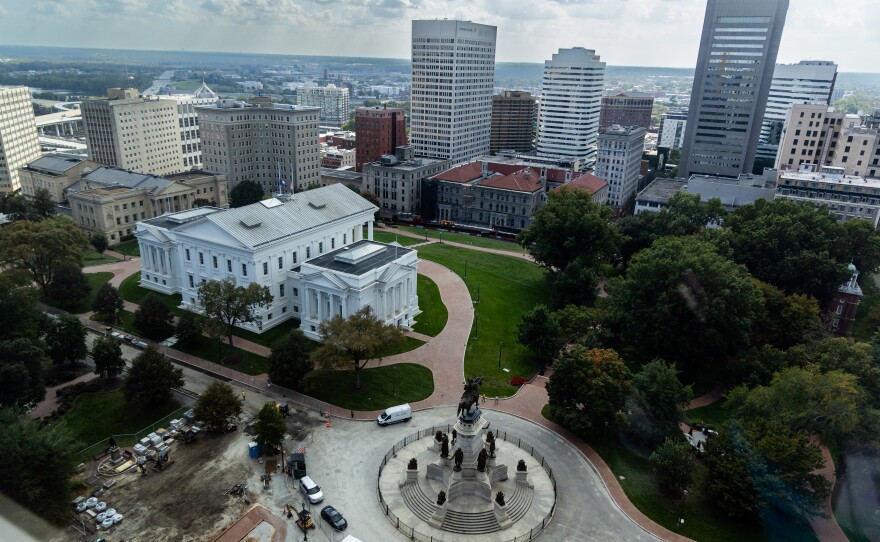When the General Assembly reconvenes on Jan. 10, Democrats will have control of both the House of Delegates and the Virginia Senate, with Republicans holding the minority seats and governorship.
This week, Virginia’s legislators began to pre-file bills and resolutions that they think are in the commonwealth's best interests. Democrats' bills include building off their previous momentum to increase the state’s minimum wage, as well as separate first-year resolutions to enshrine two new rights in the Virginia Constitution: reproductive freedom and automatic civil rights restoration in Virginia.
What have Democrats prefiled?
House Bill 1 and Senate Bill 1 — filed by Del. Jeion Ward (D–Hampton) and state Sen. L. Louise Lucas (D–Portsmouth) — would reinstate the schedule originally put in place in 2020, effectively raising Virginia’s minimum wage from its current rate of $12/hour to $13.50/hour, effective Jan. 1, 2025. It would ultimately be raised to a $15 hourly minimum effective Jan. 1, 2026.
In 2020, when Democrats had majority control of the House, Senate and governorship, lawmakers voted to gradually raise the state’s minimum wage over a three-year period. During the 2022 session, Republicans tried to freeze that legislation from taking effect.
Del. Dan Helmer (D–Fairfax) and state Sen. Creigh Deeds (D–Charlottesville) introduced House Bill 2 and Senate Bill 2, which would effectively create a ban on assault-style firearms. Under the proposed legislation, people who import, sell, manufacture, purchase, possess, transport or transfer these firearms could be charged with a Class 1 misdemeanor.
There are exceptions, however, for assault-style firearms that are permanently inoperable, antiques, manually operated or manufactured before July 1, 2024.
People who have been convicted of a Class 1 misdemeanor would then be prohibited from purchasing, possessing or transporting a firearm for three years from the date of conviction.
It would also become a Class 1 misdemeanor for anybody under the age of 21 to import, sell, manufacture, purchase, possess, transport or transfer an assault-style firearm, no matter when it was manufactured.
Democrats in the House and Senate also introduced resolutions that would start the lengthy process to amend the state constitution to enshrine reproductive rights and restoration of voting rights.
Del. Charniele Herring (D-Alexandria), along with State Sens. Jennifer Boysko (D–Herndon), Ghazala Hashmi (D–Midlothian), L. Louise Lucas, Mamie Locke (D–Hampton) and Barbara Favola (D–Arlington) authored HJ 1, which seeks to add a constitutional amendment to enshrine the “fundamental right to reproductive freedom.”
Under the proposed amendment, decisions about matters related to someone’s pregnancy cannot be “denied, burdened, or otherwise infringed upon by the Commonwealth.”
Del. Elizabeth Bennett-Parker (D–Alexandria) and Locke introduced HJ 2 to amend the state constitution so it incorporates automatic voting rights restoration to felons.
Virginia is the only state in the country where voting rights are stripped from people with felony convictions for the rest of their lives — unless they petition the governor to restore them. And under current state law, the governor is the only person who can restore those rights.
Effectively, the proposed legislation from the House and Senate would guarantee felons the right to vote unless they are incarcerated.
State Sen. Jeremy McPike (D–Prince William) also put forth legislation for a second vote on a proposed amendment that would extend a property tax exemption that is currently available to spouses of soldiers killed in action, to spouses of soldiers who have died in the line of duty.
McPike also filed legislation that would authorize the voter referendum in order to change the state constitution.
Ultimately, amendments require a resolution to be passed by a majority in both of the houses when it has convened, and will be held over to be passed yet again by the next General Assembly, with one election between the two approvals. If an amendment receives two approvals, Virginia voters have to approve the change through a referendum before it can take effect.
One of the first pieces of legislation Republicans brought forth this week involves environmental issues.
In the House and Senate, Del. Tony Wilt (R–Rockingham) and state Sen. Richard Stuart (R–Westmoreland) proposed legislation that would repeal a law tying vehicle emissions standards in the state to California’s, as opposed to looser federal guidelines.
Stuart’s bill takes things a step further by prohibiting the State Air Pollution Control Board from adopting model-year standards for vehicles, similar to what’s already in place on the West Coast.
What have Republicans prefiled?
Republicans have not yet put forth any proposed constitutional amendments, but had filed more legislation on Tuesday. State Sen. William Stanley (R–Glade Hill) filed legislation that would establish a Science, Technology, Engineering, Mathematics and Computing competition team grant program and fund that would help boost interest in STEM+C-related areas, as well as help support STEM+C-related extracurriculars in Virginia’s public schools.
State Sen. Bryce Reeves (R–Spotsylvania) also filed multiple pieces of legislation late Tuesday.
The first piece of legislation, SB SB 6, would allow people who have had their driver’s license revoked over multiple convictions of driving while intoxicated to file a petition to have a restricted driver’s license issued — without waiting for three years from the date of their last conviction to do so. However, they would first have to successfully complete a Veterans Treatment Court Program or similar program.
Reeves also introduced SB9, which aims to create a department of real estate assessment in Orange County, and “to enter into an agreement with a contiguous county or city to establish a joint department of real estate assessment.”
Under current Virginia law, counties governed by a board of government have real estate assessments created by their commissioner of the revenue.
Reeves also proposed legislation that would expand the definition of “military benefits” to include a subtraction of income tax for retirement income received for those who served in the uniformed services of the United States. Under current law, only those who served in the Armed Forces can have that income tax subtracted. Reeves’ legislation would also allow those who served in the commissioned corps of the National Oceanic and Atmospheric Administration, and the commissioned corps of the United States Public Health Service to receive that subtraction.
Legislation around hate crimes was also filed by Reeves, which would “safeguard all individuals within the Commonwealth from unlawful discrimination in employment and in places of public accommodation” because of their ethnic origin.
“The bill also provides that no provider or user of an interactive computer service on the Internet shall be liable for any action voluntarily taken by it in good faith to restrict access to material that the provider or user considers to be intended to incite hatred on the basis of ethnic origin.”



